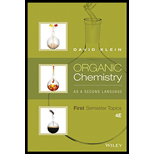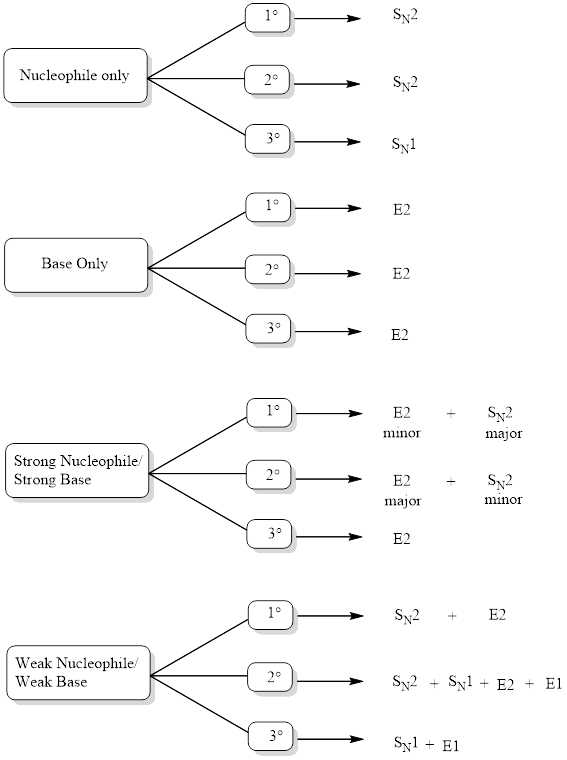
Organic Chemistry As a Second Language: First Semester Topics
4th Edition
ISBN: 9781119110668
Author: David R. Klein
Publisher: WILEY
expand_more
expand_more
format_list_bulleted
Question
Chapter 10.9, Problem 10.25P
Interpretation Introduction
Interpretation:
The mechanism that is expected to occur in the given case has to be identified.
Concept Introduction:
Three steps are followed for determining the products that will be formed in a
- 1. Function of reagent has to be determined.
- 2. The mechanism has to be determined by analyzing the substrate.
- 3. Relevant regiochemical and stereochemical requirements has to be considered.
The mechanism can be identified by looking into the flowchart given below after analyzing the function of reagent.

Expert Solution & Answer
Want to see the full answer?
Check out a sample textbook solution
Students have asked these similar questions
Pls help asap
What reagents do you need to
complete the transformation in order
(show all work)
→
No₂ Br
Pls help asap
Chapter 10 Solutions
Organic Chemistry As a Second Language: First Semester Topics
Ch. 10.2 - Prob. 10.1PCh. 10.2 - Prob. 10.2PCh. 10.2 - Prob. 10.3PCh. 10.3 - Prob. 10.5PCh. 10.3 - Prob. 10.6PCh. 10.3 - Prob. 10.7PCh. 10.3 - Prob. 10.8PCh. 10.5 - Prob. 10.9PCh. 10.5 - Prob. 10.10PCh. 10.5 - Prob. 10.11P
Ch. 10.8 - Prob. 10.12PCh. 10.8 - Prob. 10.13PCh. 10.8 - Prob. 10.14PCh. 10.8 - Prob. 10.15PCh. 10.8 - Prob. 10.16PCh. 10.8 - PROBLEMS Identify the function of each of the...Ch. 10.8 - Prob. 10.18PCh. 10.8 - Prob. 10.19PCh. 10.9 - Prob. 10.21PCh. 10.9 - Prob. 10.22PCh. 10.9 - Prob. 10.23PCh. 10.9 - Prob. 10.24PCh. 10.9 - Prob. 10.25PCh. 10.10 - Prob. 10.27PCh. 10.10 - Prob. 10.28PCh. 10.10 - Prob. 10.29PCh. 10.10 - Prob. 10.30PCh. 10.10 - Prob. 10.31PCh. 10.10 - Prob. 10.32PCh. 10.10 - Prob. 10.33PCh. 10.10 - Prob. 10.34PCh. 10.10 - Prob. 10.35PCh. 10.10 - Prob. 10.36PCh. 10.10 - Prob. 10.37PCh. 10.10 - Prob. 10.38PCh. 10.10 - Prob. 10.39P
Knowledge Booster
Similar questions
arrow_back_ios
SEE MORE QUESTIONS
arrow_forward_ios
Recommended textbooks for you
 ChemistryChemistryISBN:9781305957404Author:Steven S. Zumdahl, Susan A. Zumdahl, Donald J. DeCostePublisher:Cengage Learning
ChemistryChemistryISBN:9781305957404Author:Steven S. Zumdahl, Susan A. Zumdahl, Donald J. DeCostePublisher:Cengage Learning ChemistryChemistryISBN:9781259911156Author:Raymond Chang Dr., Jason Overby ProfessorPublisher:McGraw-Hill Education
ChemistryChemistryISBN:9781259911156Author:Raymond Chang Dr., Jason Overby ProfessorPublisher:McGraw-Hill Education Principles of Instrumental AnalysisChemistryISBN:9781305577213Author:Douglas A. Skoog, F. James Holler, Stanley R. CrouchPublisher:Cengage Learning
Principles of Instrumental AnalysisChemistryISBN:9781305577213Author:Douglas A. Skoog, F. James Holler, Stanley R. CrouchPublisher:Cengage Learning Organic ChemistryChemistryISBN:9780078021558Author:Janice Gorzynski Smith Dr.Publisher:McGraw-Hill Education
Organic ChemistryChemistryISBN:9780078021558Author:Janice Gorzynski Smith Dr.Publisher:McGraw-Hill Education Chemistry: Principles and ReactionsChemistryISBN:9781305079373Author:William L. Masterton, Cecile N. HurleyPublisher:Cengage Learning
Chemistry: Principles and ReactionsChemistryISBN:9781305079373Author:William L. Masterton, Cecile N. HurleyPublisher:Cengage Learning Elementary Principles of Chemical Processes, Bind...ChemistryISBN:9781118431221Author:Richard M. Felder, Ronald W. Rousseau, Lisa G. BullardPublisher:WILEY
Elementary Principles of Chemical Processes, Bind...ChemistryISBN:9781118431221Author:Richard M. Felder, Ronald W. Rousseau, Lisa G. BullardPublisher:WILEY

Chemistry
Chemistry
ISBN:9781305957404
Author:Steven S. Zumdahl, Susan A. Zumdahl, Donald J. DeCoste
Publisher:Cengage Learning

Chemistry
Chemistry
ISBN:9781259911156
Author:Raymond Chang Dr., Jason Overby Professor
Publisher:McGraw-Hill Education

Principles of Instrumental Analysis
Chemistry
ISBN:9781305577213
Author:Douglas A. Skoog, F. James Holler, Stanley R. Crouch
Publisher:Cengage Learning

Organic Chemistry
Chemistry
ISBN:9780078021558
Author:Janice Gorzynski Smith Dr.
Publisher:McGraw-Hill Education

Chemistry: Principles and Reactions
Chemistry
ISBN:9781305079373
Author:William L. Masterton, Cecile N. Hurley
Publisher:Cengage Learning

Elementary Principles of Chemical Processes, Bind...
Chemistry
ISBN:9781118431221
Author:Richard M. Felder, Ronald W. Rousseau, Lisa G. Bullard
Publisher:WILEY